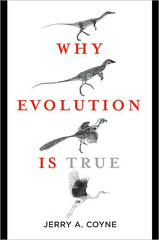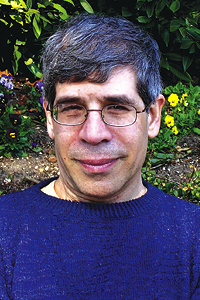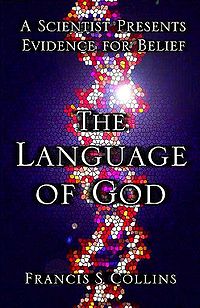 A book review of Jerry A. Coyne, Why Evolution Is True (New York: Viking, 2009).
A book review of Jerry A. Coyne, Why Evolution Is True (New York: Viking, 2009).Jerry Coyne’s, Why Evolution is True is an artifact of the battle between religion and science that has been raging since Darwin published The Origin of the Species in 1859. It presents the case for biological evolution. In its manner, attitudes, and tone , it is also as much a work of fundamentalist theology as it is of biology. Coyne has chosen to accept the fundamentalists’ construction of God and to openly debate the merits of creationism and intelligent design theories (ID) with a disdainful tone that is as ignorant of theology as it is arrogant in attitude. Coyne would have been far better served if he had stuck to his biology, made his case for evolution, and forgone his numerous ill-targeted jabs at God and creationism.
There are numerous reviews of Why Evolution is True online, and rather than add one more typical review, I will address here one of the issues raised by Coyne’s defense of evolution, namely his understanding of God. Why Evolution is True, in fact, reminds one of ancient Christian apologetic works defending orthodox theology against various heresies. The actual writings of the heretics no longer exist so that all we know about them we learn from their orthodox critics. We do not know what the “heretics” actually believed and how they expressed themselves. If, two thousand years from now the only references to “ancient Christianity” were contained in a musty, fragile copy of Why Evolution is True, one shudders to think how future scholars would understand early 21st century religious faith. For, what we find in this book is not a fair and knowledgeable description of religious faith’s relationship to science but more of a caricature of an ignorant, willful monster that must be slain.
It is somewhat ironic but probably inevitable that Coyne would appropriate his fundamentalist protagonists’ understanding of God. It does him no credit that he does not seem to realize that there are other ways to understand and talk about God. The result is a “theology” that is at once willful and ignorant. Coyne’s superficial understanding of God seems to be that God is an individual entity of some sort that designed the universe much the way an engineer designs a bridge or an architect designs a building. Based on this theology, Coyne then repeatedly mocks God’s skills as a designer of nature because of all of the “bad designs” of individual species produced by evolution (see p. 54 cf. p. 69). His argument: evolutionary adaptation has led to strange compromises in terms of organs and structures in many species, which make no sense if God designed them. He writes, “There is no reason why a celestial designer, fashioning organisms from scratch, like an architect designs buildings, should make new species by remodeling the features of existing ones.” (p. 54) Only evolution, in his view, reasonably accounts for the forms that we actually find in nature.
 |
| Dr. Jerry Coyne |
There are other ways to understand God’s role in creation. Knowing what we know about the extent, complexity, and majesty of the universe from science, for example, it makes more sense to understand that God is the author of the ongoing process of creation. Biological evolution itself embodies freedom and law in immensely creative ways and the human race can be seen as one expression of divine creativity built into the process of evolution.
Coyne himself stands in awe of the beauty of evolution and its massive creative force. He considers it wondrous, marvelous, and even speaks of drawing “spirituality from science.” (pp. 232-233) How is it that he doesn’t seem to stop even for a moment and contemplate the possibility that there is a “something,” a “presence,” or a “force” that “was” before creation and “is” larger still than the universe, which set the evolutionary forces of creation in motion. This Something Beyond is unimaginably greater than his tiny little designer guy God.
For Coyne, however, there is nothing Beyond. He contends, rather, that evolution teaches us that, “like other animals, we are contingent products of the blind and mindless process of natural selection.” (p. 192) This characterization is a theological (or ideological) statement of personal belief based solely on conjecture. Coyne provides no proof, and we can be sure he would provide us with data to make his point if there was any available. Instead of data he gives his readers an anthropomorphic description of evolution as being “blind and mindless.” It’s as if evolution is a category of (human) being that could have eyes and a mind but doesn’t. What he apparently means is that evolution is a self-starting, self-driven process that is unguided by anything outside of itself. Fair enough. Where’s the data? How does he know that evolution is not a guided process?
 This is a fair question esp. given his discussion of “artificial” selection as opposed to “natural” selection. Artificial selection is a rationalized, purposeful, and guided form of evolutionary process conducted by a breeder. In artificial selection, “the criterion of reproductive success is human desire rather than adaptation to a natural environment.” (p. 127) Coyne even goes on to point out that at times artificial selection via human breeding and natural selection ends up with similar designs, for example, the greyhound (artificial) and the cheetah (natural). That is, the product of “blind, mindless” natural selection looks very much like the product of guided, purposeful (mindful!) artificial selection. It is a tribute to the blinders Coyne wears that he does not even pause for a moment to at least consider the implications of guided selection for evolution generally. Is it a mere coincidence that larger evolutionary process can in fact be guided, controlled even, by a rational mind to purposeful ends. Could guided selection not imply—just maybe—that the proper metaphor for God is that of breeder rather than mechanic?
This is a fair question esp. given his discussion of “artificial” selection as opposed to “natural” selection. Artificial selection is a rationalized, purposeful, and guided form of evolutionary process conducted by a breeder. In artificial selection, “the criterion of reproductive success is human desire rather than adaptation to a natural environment.” (p. 127) Coyne even goes on to point out that at times artificial selection via human breeding and natural selection ends up with similar designs, for example, the greyhound (artificial) and the cheetah (natural). That is, the product of “blind, mindless” natural selection looks very much like the product of guided, purposeful (mindful!) artificial selection. It is a tribute to the blinders Coyne wears that he does not even pause for a moment to at least consider the implications of guided selection for evolution generally. Is it a mere coincidence that larger evolutionary process can in fact be guided, controlled even, by a rational mind to purposeful ends. Could guided selection not imply—just maybe—that the proper metaphor for God is that of breeder rather than mechanic?And then there is Coyne’s discussion of the role of culture in evolution. Culture, utilizing sexual selection, can be a surprisingly powerful agent in evolutionary change. Apparently, at the human level, cultural selection gives women the upper hand as their collective, cultural tastes in men can produce evolutionary-like changes in the whole culture. Again, humans exercise an element of control over evolution. We are able to rationalize it (see. p. 215). Coyne says that the role of culture in evolution is still speculative, but it didn’t apparently encourage him to speculate on what “gene-culture coevolution” might mean theologically.
We can only conclude that wittingly or unwittingly Coyne uses a mechanistic metaphor of engineer (or architect) to define God and then complains that God is a bad designer of living beings. Would not the metaphor of God as breeder be more appropriate? How would it change Coyne’s arguments and presentation if he evaluated God’s "skills" in terms of breeding? How would it change his valuation if he saw God as a breeder who is using evolution to ends that we don’t even remotely understand today? Applying the metaphor of breeder, would not the categories of marvelous, wondrous, and even awe-inspiring apply? Coyne, that is, has chosen a metaphor for God appropriate not to his biological subject but one used by his Newtonian protagonists, the fundamentalists and biblical literalists, who still live in a mechanistic, clockmaker world.
Perhaps no single statement better exposes Coyne’s failure to understand the implications of his own fundamentalist theology than the one that reads,
Now, science cannot completely exclude the possibility of supernatural explanation. It is possible—though very unlikely—that our whole world is controlled by elves. But supernatural explanations like these are simply never needed: we manage to understand the natural world just fine using reason and materialism. Furthermore, supernatural explanations always mean the end of inquiry: that’s the way God wants it, end of story. Science, on the other hand, is never satisfied: our studies of the universe will continue until humans go extinct. (pp. 224-225)Coyne’s admission that supernatural explanations can’t be “completely excluded” is widely granted by other atheistic authors, but it is interesting how quickly he closes down any serious consideration of the possibility with his fanciful, sarcastic introduction of elves. And from elves, he easily jumps to the assertion that supernatural explanations are never needed. If such explanations were only about fairies and elves, any reasonable theist would agree with him. If, in fact, such explanations posit a fundamentalist God, many theists would still agree. But, suppose instead of elves we consider supernatural explanations that draw on the wisest writings of the “high” religions, does his assertion that supernatural explanations are never needed still stand? Well, it might. But, who knows? Coyne has no actual serious data to back up his assertion. He assumes his description of evolution proves the point, apparently, but that data is about physical phenomenon and says not one thing about the world of the Spirit. Coyne tries to force the conclusion that we never need supernatural explanations by stating that reason and materialism work just fine for understanding the natural world. Of course they do. However, there is much more to life than the natural world narrowly (scientifically) defined. Theists point time and again to relationships, culture, experiences in beauty and ugliness, the power of music to move us, the undeniable impact of deep meditation and prayer, and other non-materialistic phenomena to make the point that the there is more to reality than the natural world narrowly constructed. And in these realms, spiritual understanding does serve to give meaning where materialism is useless and irrelevant.
It is simply not true, furthermore, that “supernatural explanations always means the end of inquiry,” unless one limits theological inquiry to the writings of narrow fundamentalism. John Polkinghorne, writing in Belief in God in an Age of Science (Yale, 1998) demonstrates how Christian theological inquiry shows clear parallels with scientific inquiry (pp. 29ff). Both are open-ended pursuits of truth where new findings lead to further study and another generation of insights. Coyne, however, blithely asserts as an absolute truism that God-talk always terminates inquiry without the slightest bit of data to prove his point—in striking contrast to his careful presentation of biological data in proof of evolution. Anyone who has spent any appreciable amount of time with serious works of theological inquiry knows that Coyne is simply wrong in his assertion.
If judged on the basis of its science, then, Why Evolution is True, is probably a decent work given especially that it addresses a lay audience. It is well written, flows well, and makes a logical case for evolution. Other scientists may find his commentary lacking at one point or another, but we will leave that to the scientists to sort out. When judged on the basis of his theology, however, Coyne is a disaster—arrogant and ignorant at the same time. He assumes a god that is about as unlike the God of the theologians and millions of faithful believers—aside from worst-case fundamentalists—as could possibly be. He makes rash, unsubstantiated ideological statements that betray superficial thinking about religion.
Maybe, saddest of all, Coyne never does realize that one can be an evolutionist, really and truly, and a theist, really and truly. There is nothing inherently in conflict between the two. He is, instead, a rigid ideological dualist when it comes to science and religion, which is curious when we consider that the whole spirit of science today is drawing us ever deeper into a wonderfully holistic universe of stunning movement, dynamic change, and profound integration. At any rate, for those of us who have some background in theological studies, Coyne is of a type we know all too well. His ideology is exclusivist, imperialist, and dualistic. He is playing a zero-sum game where he always wins, never loses—and is evidently incapable of hearing any voice but those of his own tribe. We know his type. He is a fundamentalist.
In sum, Coyne is a decent place to start if one is looking for insights into the truths of biological evolution. If, however, the reader is seeking a contribution to the dialogue between faith and science Coyne has nothing to contribute. Why Evolution is True is at best an all too typical example of how ignorant a certain tribe of atheist scientist writers are about religion in general and theology in particular. Ideological warfare of this sort is a sad, insidious thing; and we can only note again that such warfare is a form of violence, and violence always has unintended and seldom happy consequences.


